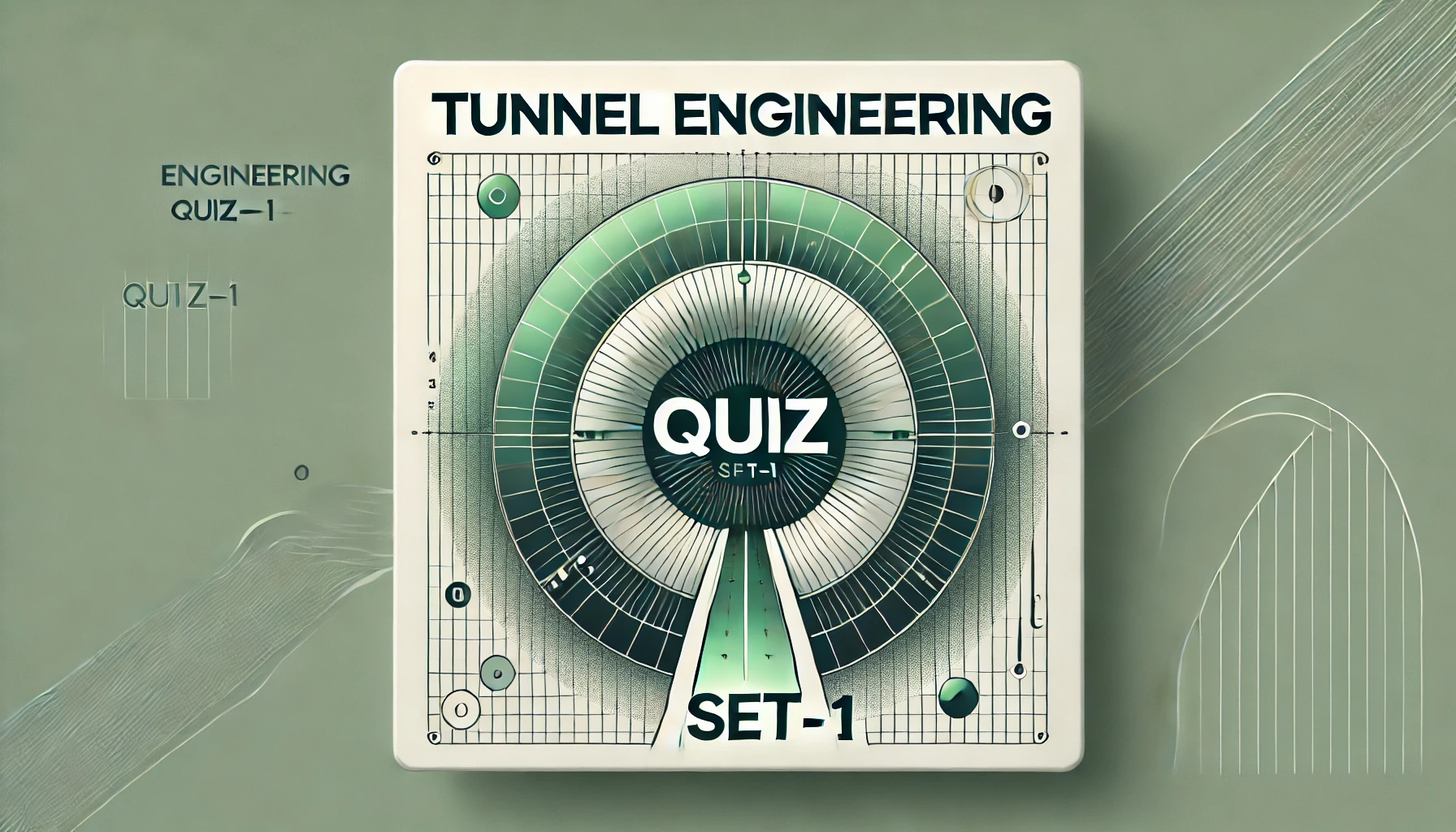Tunnel Engineering Quiz Set-1 [2025]
Welcome to “Tunnel Engineering Quiz Set-1 [2025]”! In this blog, we’ve curated 50+ thought-provoking multiple-choice questions covering the fundamental and advanced concepts of tunnel engineering. “Tunnel Engineering Quiz Set-1 [2025]” is designed to help you refresh your basics, challenge your knowledge, and gain practical insights into the techniques and principles of tunnel construction and design. Whether you’re a civil engineering student, a tunneling professional, or preparing for competitive exams, this quiz is the perfect way to enhance your expertise in tunnel engineering. Let’s dive into the “Tunnel Engineering Quiz Set-1 [2025]” and start exploring! Tunnel Engineering: A Comprehensive Guide Tunnel engineering is a vital aspect of civil engineering, focusing on the design, construction, and maintenance of tunnels for various applications, such as transportation, water conveyance, and utilities. With technological advancements, tunnel engineering has evolved into a highly specialized field, requiring expertise in geology, structural engineering, and advanced construction techniques. This blog delves into the fundamentals, types, methods, and importance of tunnel engineering while addressing frequently asked questions (FAQs). What is Tunnel Engineering? Tunnel engineering refers to the planning, design, and construction of underground passages used for various purposes, such as roadways, railways, water systems, and subways. The field combines knowledge of geology, structural stability, environmental considerations, and engineering techniques to create safe, efficient tunnels. See Also: Steel Structures Quiz Set-1 Importance of Tunnel Engineering Improved Transportation: Tunnels enable faster and uninterrupted transportation, especially in densely populated urban areas or challenging terrains like mountains. Resource Conveyance: They facilitate water supply, sewer systems, and electrical conduits in cities and rural areas. Reduced Environmental Impact: Unlike above-ground construction, tunnels reduce land use and preserve natural habitats. Strategic and Military Applications: Tunnels play a critical role in defense operations, providing secure underground passages. Types of Tunnels Tunnel classification is based on their purpose and the material through which they pass. Below are the major types of tunnels: 1. Transportation Tunnels Road Tunnels: Built for vehicular traffic in urban areas, mountains, or under rivers. Rail Tunnels: Used for metro systems, high-speed trains, and freight transportation. 2. Utility Tunnels Serve as underground passages for water supply, sewage, electricity, and telecommunication cables. 3. Hydraulic Tunnels Designed for water conveyance in dams, hydropower plants, or irrigation systems. 4. Mining Tunnels Used to extract minerals, coal, or ores from beneath the earth’s surface. See Also: Airport Engineering Quiz Set-1 Tunnel Construction Methods The construction of tunnels involves multiple methodologies, depending on factors like geological conditions, tunnel size, and purpose. Here are the most commonly used methods: 1. Cut-and-Cover Method This involves excavating a trench, building the tunnel, and then covering it. It is suitable for shallow tunnels. 2. Boring Method Tunnel boring machines (TBMs) are used to drill through soil and rock. This method is efficient and minimizes surface disruption. 3. Drill-and-Blast Method Commonly used in hard rock, this involves drilling holes, placing explosives, and blasting the rock to create the tunnel shape. 4. Immersed Tube Method Pre-fabricated tunnel sections are floated to the site, sunk into place, and joined together. This method is often used for underwater tunnels. 5. NATM (New Austrian Tunneling Method) This method uses the surrounding rock as a natural support system and is widely applied in soft and mixed ground conditions. Challenges in Tunnel Engineering Geological Uncertainty: Variability in soil and rock conditions can pose risks to stability and safety. Water Ingress: Dealing with groundwater is a major challenge, requiring advanced drainage and waterproofing techniques. Cost and Time Overruns: Tunnel projects often encounter delays and budget increases due to unforeseen conditions. Environmental Impact: Balancing construction with minimal disruption to ecosystems is critical. Innovations in Tunnel Engineering Advanced TBMs: Modern TBMs come equipped with sensors, automation, and real-time monitoring to improve efficiency. Smart Tunnels: Incorporating IoT (Internet of Things) technologies for monitoring structural health, ventilation, and safety. Sustainable Practices: Use of recycled materials, reduced energy consumption, and eco-friendly construction methods. See Also: Transportation Engineering Quiz Set-1 FAQs About Tunnel Engineering 1. What are the primary factors to consider when designing a tunnel? Geological and geotechnical conditions, tunnel purpose, safety standards, and environmental impact are the primary factors to consider. 2. What is the role of geology in tunnel engineering? Geology determines the type of soil and rock through which the tunnel will pass, influencing construction methods, safety measures, and cost. 3. How is ventilation managed in long tunnels? Ventilation systems are installed to ensure air quality by removing exhaust gases and providing fresh air. 4. What are the common safety measures in tunnel construction? Safety measures include monitoring ground movement, proper ventilation, fire safety systems, and worker training. 5. What are some famous tunnel engineering projects? Examples include the Channel Tunnel (UK-France), Gotthard Base Tunnel (Switzerland), and Tokyo Bay Aqua-Line (Japan). Conclusion Tunnel engineering is a fascinating and essential field that combines innovation, science, and engineering to solve complex problems. From improving transportation systems to enabling resource conveyance, tunnels play a vital role in modern infrastructure. With advancements in technology and sustainable practices, the future of tunnel engineering looks promising. Whether you’re a civil engineering student or a professional, understanding the principles of tunnel engineering is crucial for contributing to this dynamic industry.
